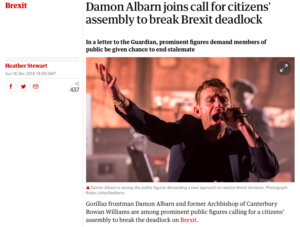Our politics and our parliament is in deadlock over Brexit. But if we choose to learn from other countries in how we resolve our differences, this could be a moment when Britain comes together rather than falls apart in constitutional chaos.
Looking on, we cannot see how a majority can be found for any proposition in Parliament: some want to Remain, some want no deal, some want Norway, some want to vote again. The same rifts exist across the UK. Anger and resentment are growing, splitting families, communities and our country. Without a new intervention, the toxic culture, which has infected public life, will irrevocably damage democracy and the future for us all.
Each of us individually has different views on what should happen next when it comes to Brexit, but each of us agree that finding a way forward is vital to restoring faith in our democracy. We are not MPs and we respect the important work they do. Yet, we also recognise there are important ways to help heal this rift and involve the public in deeper and more meaningful ways.
Citizens’ assemblies operate around the world to create a neutral forum for evidence-based, participative decision-making. In recent years, they have been used in Ireland, British Columbia and Iceland, and in national and local government in the UK, as democratic ‘circuit-breakers’ on contentious and complex issues. Taking eight weeks to organise, such assemblies are constructed of a randomly chosen representative group of up to 500 members of the public. They hear a broad range of evidence and arguments on a subject, which they discuss and weigh up before making considered recommendations to their political representatives.
A forum led by the public, not by politicians. People talking and listening to each other, not shouting and arguing on or offline, to find common ground. Not superseding MPs by judging the outcome, but offering recommendations on how Brexit should be decided, to help break this deadlock and start to heal the nation’s bitter divisions.
Brexit has come to test the patience of the British public. To make progress we should instead trust their wisdom and use it to resolve our differences, deepen our democracy and unite us all.
Sign the petition for a Citizens’ Assembly on Brexit here.
Signed,
Baron Rowan Williams
Damon Albarn, musician
Baroness Ruth Lister
Rabbi Laura Janner-Klauser
Jonathan Coe, novelist
Ian McEwan, novelist
Caitlin Moran, journalist
Neal Lawson, Compass
Anshu Srivastava, member of The Full Brexit
Alexandra Runswick, Unlock Democracy
Dr Jess Garland, Electoral Reform Society
Professor Graham Smith, Centre for the Study of Democracy
Francesca Klug OBE, Human Rights Expert
Nick Lowles MBE, Hope Not Hate
Anthony Barnett, founder of Charter 88
Lord Michael Wills
Graham Allen, Citizens’ Convention on UK Democracy
Tim Hughes, Involve
Professor Nick Pearce, The Institute for Policy Research, University of Bath
Bishop Nick Baines, Leeds
Peter Cross, Sortition Foundation


We could actually crowdfund this and just do it, especially if the experts who ran the September 2017 pilot were willing to build on that. It should have a strong advisory weight. And it should be a step towards a more participatory future, where citizens get the chance to do more than place the occasional x in a box, leading to power-hungry career politicians making decisions for wrong reasons.
Random is unlikely to be representative unless the sample is very large. Maybe stratified sampling, but then you have to say which are the important factors – gender, social class, age, ethnicity, geographical location. It would probably take six months to a year to even arrive at the names of a representative panel of 200-500 citizens who were willing to take part
I agree with what you have written re causes of constitutional crisis, need for Citizen’s Assembly. Scottish Parliament was the result of an ‘informal’ Constitutional Convention, similar to Citizen’s Assembly.. However, I think that all I have seen re the need for proportional representation etc misses a vital point. The problem with nearly all electoral systems (and referendums) is that they are based on first-past-the-post counting and end up NOT representing large swathes of the population (not least Brexit). Even the PR system used for the Scottish Parliament has a majority of MSPs elected by 1st past the post and the remainder, elected to give proportionality, don’t represent anyone in particular.The only PR system that overcomes this deficiency is the Single Transferable Vote and it is essential that this is the one that is adopted.
In reply to Thomas. The Single Transferable Vote (STV) is no way near as proportional as the Additional Member System (AMS). It does, however, have the advantage of allowing electors to vote in order for candidates of different parties, perhaps giving more choice. But, as most constituencies nowadays have at least five parties competing in them for election, the result across the country would be very disjointed and lacking much proportionality. STV multi-member constituencies couldn’t accommodate all those parties accurately with some parties just missing out and others being over-represented. Unless, that is, those multi-member constituencies were truly massive, but then they would not really represent particular localities. AMS gives proportionality whereas STV is now past its sell by date. Would have been ok after the second world war when only two or three parties were in the running. The Lib Dems still support STV as they think they can get a leg up with that system as they imagine they are everybody’s second choice. AMS is used for the Scottish parliament and the London and Welsh assemblies. We should now be arguing for it to be used for elections to the House of Commons as well.